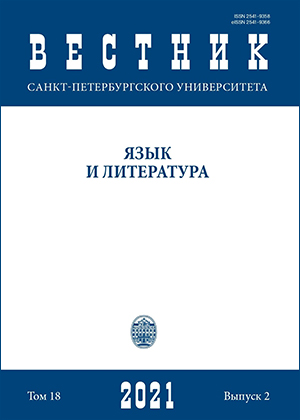Cognitive and pragmatic peculiarities of positive and negative food representation in Russian media discourse
DOI:
https://doi.org/10.21638/spbu09.2021.210Abstract
The article is devoted to the analysis of cognitive and pragmatic aspects of food representation in media discourse as well as peculiarities of the language means of such representation. The language means used for the realization of cognitive models referring to the spheres of entertainment, cooking and eating as well as the models referring to the negative aspects of food representation in Russian media discourse are investigated. The article also studies the connection between the realization of cognitive models and journalists’ pragmatic goals aimed at a positive or negative representation of food in media discourse. The cognitive models’ dominant components are analyzed. The promotion of such components as participants, food and drink, place, entertainment, characteristics of the object (food), action, consequences, etc., is driven by journalists’ pragmatic goals aimed at drawing attention to particular dishes or preventing the negative consequences of consuming a certain food. Filling the components of the cognitive model with particular contents by means of language units results in achieving the journalist’s goal. The article also investigates the connection between various spheres of human life established by the representation of food. The authors refer to the peculiarities of the realization of the cognitive model “Food as a source of danger”. The results of the undertaken research can be used for analyzing the realization of cognitive models in other types of discourse as well as in theoretical courses on text linguistics, discourse analysis, and media linguistics.
Keywords:
Russian media discourse, food representation, cognitive models, dominant components, food
Downloads
References
Chernyavskaya 2017 — Chernyavskaya V. E. Methodological opportunities of discourse analysis in corpus linguistics. Bulletin of Tomsk State University. Philology. 2017, (50): 135–148. https://doi. org/10.17223/19986645/50/9. (In Russian)
Eco 2005 — Eco U. The role of the reader. Exploration in the semiotics of texts. St. Petersburg: Symposium Publ., 2005. 491 p. (In Russian)
Eddy 2019 — Eddy J. Food for thought? The cultural appropriation of food in contemporary media. SKASE. Journal of Literary and Cultural Studies. 2019, 1 (2): 40–50. http://www.skase.sk/Volumes/SJLCS02/pdf_doc/05.pdf/ (accessed: 14.04.2020).
Evseeva, Kreidlin 2017 — Evseeva I. V., Kreidlin G. E. Frame modelling of lexical word-building nests with ‘illness’ meaning. Bulletin of Tomsk State University. Philology. 2017, (49): 5–23. https://doi. org/10.17223/19986645/49/1. (In Russian)
Fischler 1988 — Fischler C. Food, self and identity. Social Science Information. 1988, (27): 275–293.
Ivantsova 2018 — Ivantsova E. V. The concept “bread” in the discourse of a dialect language personality. Bulletin of Tomsk State University. Philology. 2018, (56): 47–64. https://doi.org/10.17223/19986645/56/4. (In Russian)
Matrozi-Marin 2018 — Matrozi-Marin A. Food and language as means of communication and markers of social and cultural identity. In esse: English Studies in Albania. 2018, 9 (1): 120–135.
Olyanich 2015 — Olyanich A. V. Gastrinomical discourse. Discourse Pi. 2015, 12 (2): 157–160. (In Russian)
Pozhidaeva, Karamalak 2018 — Pozhidaeva E. V., Karamalak O. A. Hashtags in social networking sites: in- tentions and affordances (as exemplified by the posts in English on “food” topic). Bulletin of Tomsk State University. Philology. 2018, (55): 106–118. https://doi.org/10.17223/19986645/55/8. (In Russian)
Shevchenko 2018 — Shevchenko V. D. Representation of cooking in the British media discourse: cognitive and pragmatic aspects. In esse: English Studies in Albania. 2018, 9 (1): 109–119.
Shevchenko, Shevchenko 2019 — Shevchenko V. D., Shevchenko E. S. Artistic form in social communication. Current Issues in Philology and Pedagogical Linguistics. 2019, (1): 46–52. https://doi.org/10.24410/ GW31-FW09. (In Russian)
Tomaščíková 2012 — Tomaščíková S. Media narratives: the means of communication and consumption. In: A Journey through Knowledge: Festschrift in Honour of Hortensia Pârlog. Newcastle upon Tyne: Cambridge Scholars Publishing, 2012. P. 96–108.
Tomaščíková 2015 — Tomaščíková S. Cultural heritage and food — new media narratives — new meanings and new identities. European English Messenger. 2015, 24 (2): 49–57.
Tomaščíková 2019 — Tomaščíková S. Food in the media: above and below the sea level of a hypermodern culture. In: Šnircová S., Tomaščíková S. (eds). Postmillennial Trends in Anglophone Literatures, Cultures and Media. Newcastle upon Tyne: Cambridge Scholars Publishing, 2019. P. 156–173.
Vorkachev, Vorkacheva 2019 — Vorkachev S. G., Vorkacheva E. A. Discourse and its typology in Russian linguistics. Current Issues in Philology and Pedagogical Linguistics. 2019 (3): 14–21. https://doi. org/10.29025/2079–6021-2019-3-14-21. (In Russian)
Downloads
Published
How to Cite
Issue
Section
License
Articles of "Vestnik of Saint Petersburg University. Language and Literature" are open access distributed under the terms of the License Agreement with Saint Petersburg State University, which permits to the authors unrestricted distribution and self-archiving free of charge.






